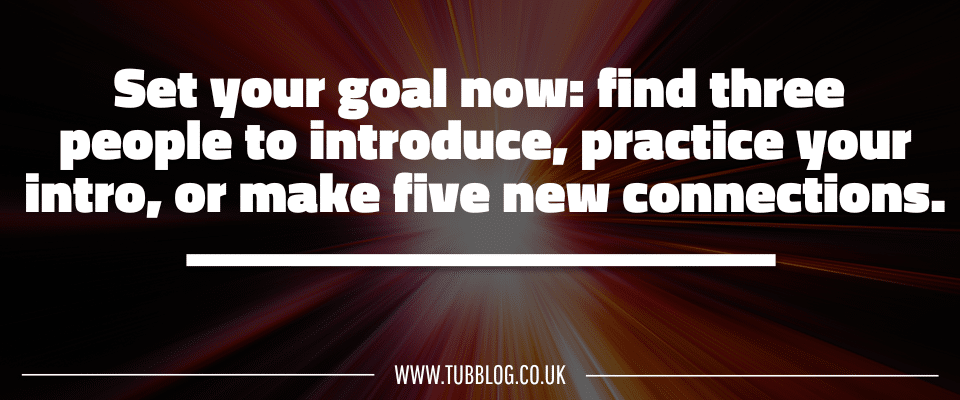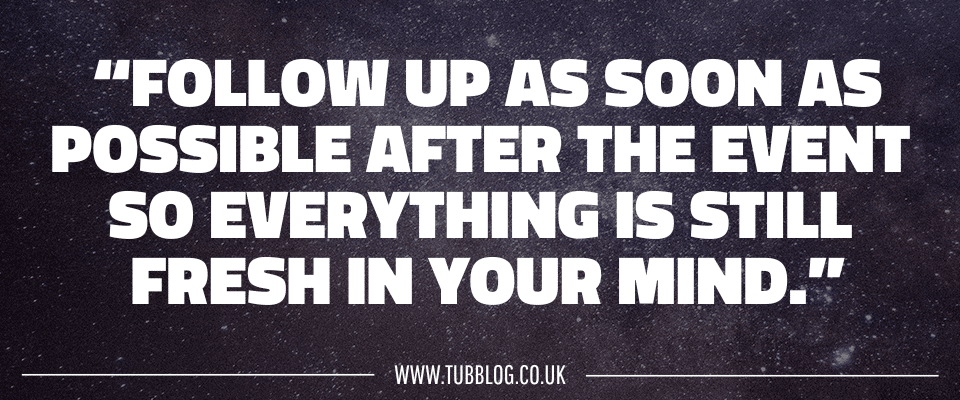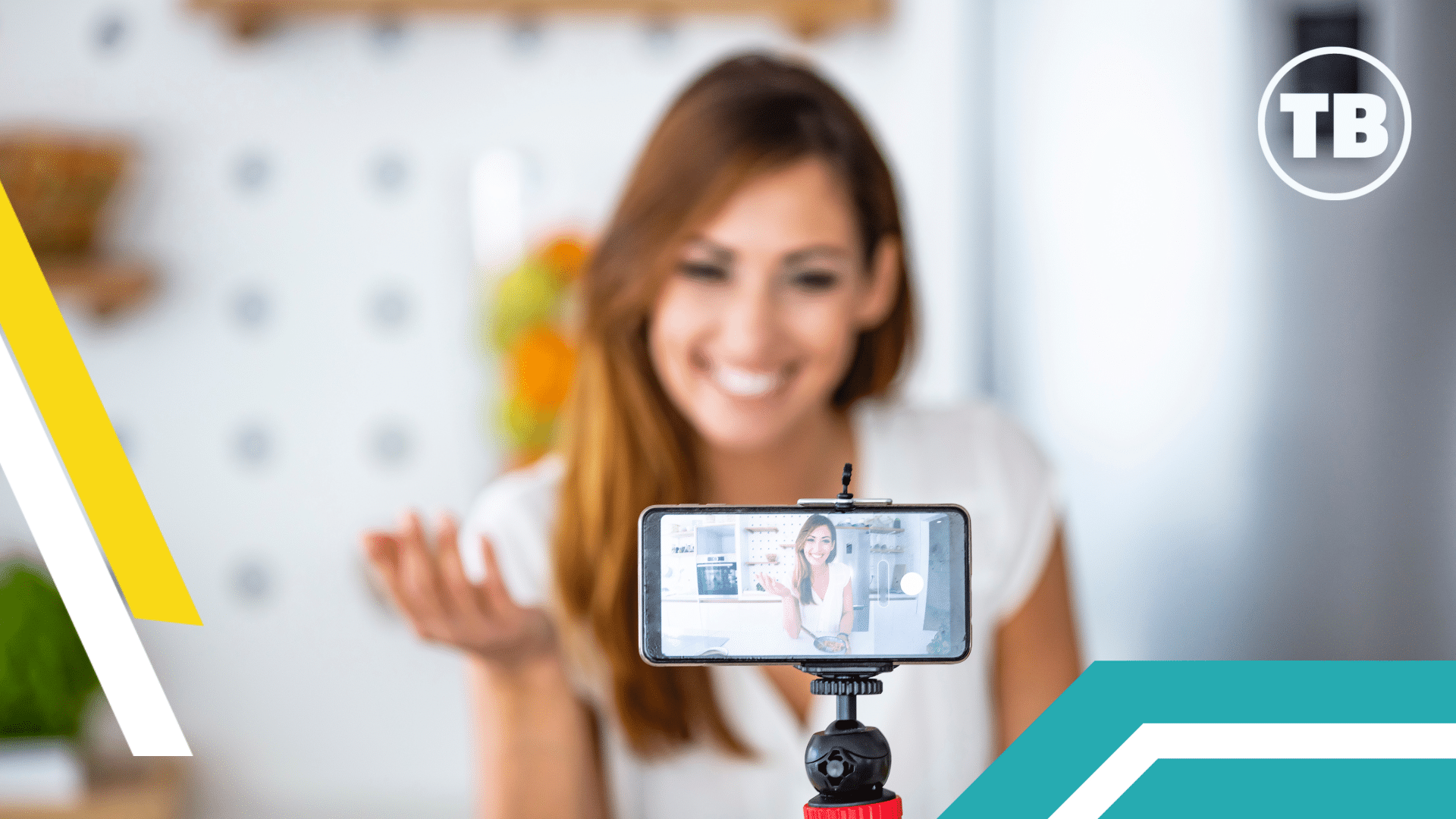
So hopefully I’ve persuaded you that it’s worth taking time out of your schedule to attend a networking event? Good! Now to share some tips so you can network effectively and get the results you want from it.
I’ve split this into three sections, so you can do some prep beforehand and ensure you follow up properly afterwards.
Before You Attend the Networking Event
You don’t need to do too much prep ahead of time, but it’s worth spending 20 minutes the night before your event to answer these questions.
What’s your objective?
As we’ve said in earlier posts, the purpose of networking is not solely to find new clients. However, if you have an offering that you think people will appreciate, it’s fine to go with the intention of promoting it. But don’t be overtly salesy and force it on everyone. Be selective with who you mention it to and listen to what they need first.
It’s preferable to go with a goal of giving rather than receiving. Can you find three people you could introduce to someone in your network? Maybe you just want to practice your intro or you’d like to make five new connections. Set your goal now.
Can you see the attendee sheet?
Having sight of the attendee sheet prior to the event is helpful. For virtual events, these are normally circulated along with the Zoom link a day or so before the session. Likewise, in-person sessions often share these with confirmation of date/time/location.
This is great, because it means you often have their website addresses to do some prior research and decide if you want to seek them out at the event. You may also choose to connect with them on LinkedIn ahead of time. Send a personal message to let them know that you’re both attending the same event.
Often the sheet will provide email addresses too. No matter what you do, do not add these emails to your newsletter list! Don’t send people unsolicited emails, either. Find the person on LinkedIn or at the meeting and make sure you have a conversation. If they ask you to email them or add them to your distribution list, then you can do so.
Who would you like to meet?
Is there someone specific you’d like to meet who isn’t on the attendance list? Can you find out if anyone who is there can make an introduction for you? If they are attending, what’s the best way to ensure you get a 1:1? Should you arrange it ahead of time? How will you recognise them if there aren’t name badges?
Or would you like to make connections with people in a specific industry? Again, is there an attendee who could refer you? Or is there an industry-specific event that you could attend or even speak at? Who’s the best person to help with that?
Do you need an elevator pitch?
The organiser should be able to tell you if you need to introduce yourself to the rest of the group. The elevator pitch (sometimes referred to as a ’60 second pitch’ because that’s how long it should take you) is a succinct summary of what you do and who you do it for.
If you go to a lot of events, you might already have your intro prepared. But if it’s been a while, your business has changed or you’d like to give one tailor-made to the meeting, spend some time rehearsing this before you go.
Remember that you’ll also need to tell people you meet one-on-one about your business. So look at how you can craft a one- or two-line version of your elevator pitch so you’re ready when someone says: “And what is it you do?”

During the Networking
If you’re a seasoned pro, maybe you don’t need to think ahead about what you’ll do when you’re at the event. But here are a couple of things you might want to consider.
Joining in Conversations
There’s nothing more intimidating than facing a wall of suited backs and feeling that to join in would be an intrusion. But for the most part, people will welcome new faces into a conversation. Before you approach, consider the body language. If there are only two people engaged in a deep and meaningful, leave them to it.
But if there are a few people, and you’ve seen others join the group, then be bold and squeeze in with a smile on your face. Listen to the topic of conversation and chip in at an appropriate point – don’t interrupt.
If nobody acknowledges you, introduce yourself to the person nearest you or someone who looks quiet. Event organisers often give ice-breakers at the start of the session so that can be a good opener. Or try my favourite trick – hover around the coffee station. Spilling the milk is optional!
Speed Networking
Speed networking doesn’t happen at all events, but it’s a good way to get to know lots of people in the (virtual) room. You might be given a number at the start of the session, and you’re encouraged to hunt out another digit.
Alternatively, speed networking might involve some musical chairs, with participants moving along the table or around the room. The ‘speed’ element refers to how long you have – sometimes it’s only as short as one minute. There’ll be a buzzer of some sort to tell you to move on.
This is where the abridged version of your elevator pitch comes in. Listen carefully to what the other person tells you and offer a solution if you have one. You might want to have your business cards, QR code or other link ready to hand over.
You might want something to take notes on – a pen and paper is probably less intrusive than using your smartphone to jot things down. Definitely don’t record the chat!
Round Table Problem-Solving
A round table set-up is a great way to get to know a smaller group of attendees better. It gives you a chance to have a proper conversation and find out more about their businesses.
The round table sessions are usually one part of a more traditional networking event. There are usually two, or sometimes three. It’s up to the organiser to decide if you stay with the same group for each one or they’d like you to move around.
Also, the topics can vary, but attendees are usually encouraged to share a current challenge and then an ‘ask’ – an introduction or a recommendation. You might also be asked to share a recent win.
It’s useful to plan your questions ahead of time and take lots of notes. But listen carefully to everyone else. Because not only is there a possibility that you can help them, but someone might make a suggestion that you could use too.
Remove Yourself From Conversations
This is the bit I’m bad at! I’m very British and find it hard to walk away from someone I’ve been talking to for a while. I tend to hope that they’ll leave first or someone will interrupt us.
But you should be proactive if the conversation isn’t going anywhere and there are other people you’d like to meet. You could fake a phone call or excuse yourself to find the loo, the organiser or another biscuit. Or even (pretend to) leave!
Or you could just be brave and say: “It was great to meet you today. Please excuse me as there are some other people I’d like to catch up with.” If the conversation has gone well but you’d still like to mingle, take them with you to join a new group.
What to do After You’ve Been Networking
Put half an hour or so in your diary to follow up on any actions arising from the networking session. And try to do this as soon as possible after it finishes! That way everything will still be fresh in your mind.
Follow-up Process
You might have a standard process that you carry out after each event. That might be things like:
- Connect on LinkedIn
- Add details to your CRM
- Add someone to your mailing list
- Type up your notes
- Research a tool or other recommendation
Or you might do something different specific to the event you were at. Again, do it as soon as you can.
Future Events
Was this a one-off event or are there regular meetings? Do you need to join or make a payment in order to attend again? If there’s a subscription, look at what’s included and what’s expected of you. As we’ve mentioned before, BNI members have to attend every week or send a proxy.
Get the dates for the next few meetings and pop them in your diary now. Are there any clashes? If so, can you rearrange anything you’ve already got booked in or will you have to skip a certain date? Check now!
Did you Promise Anything?
If you promised to do something, no matter how small, make sure you do it as soon as you can. Not doing so makes you look unprofessional and unreliable and can have an impact on your relationships with the other attendees.
Perhaps you said you’d connect with someone on LinkedIn, or offered to make an introduction to someone else. Open your email account and get it done straight away. Likewise, forward any links, useful articles or other resources, either via email or LinkedIn DM.
Or maybe you met someone you’d like to work with in some capacity. You may not have promised them something, but you made a note to send them something as a surprise to show how helpful you are. If so, do that now.
What else would you put on this list? Let us know in the comments!
















Comments